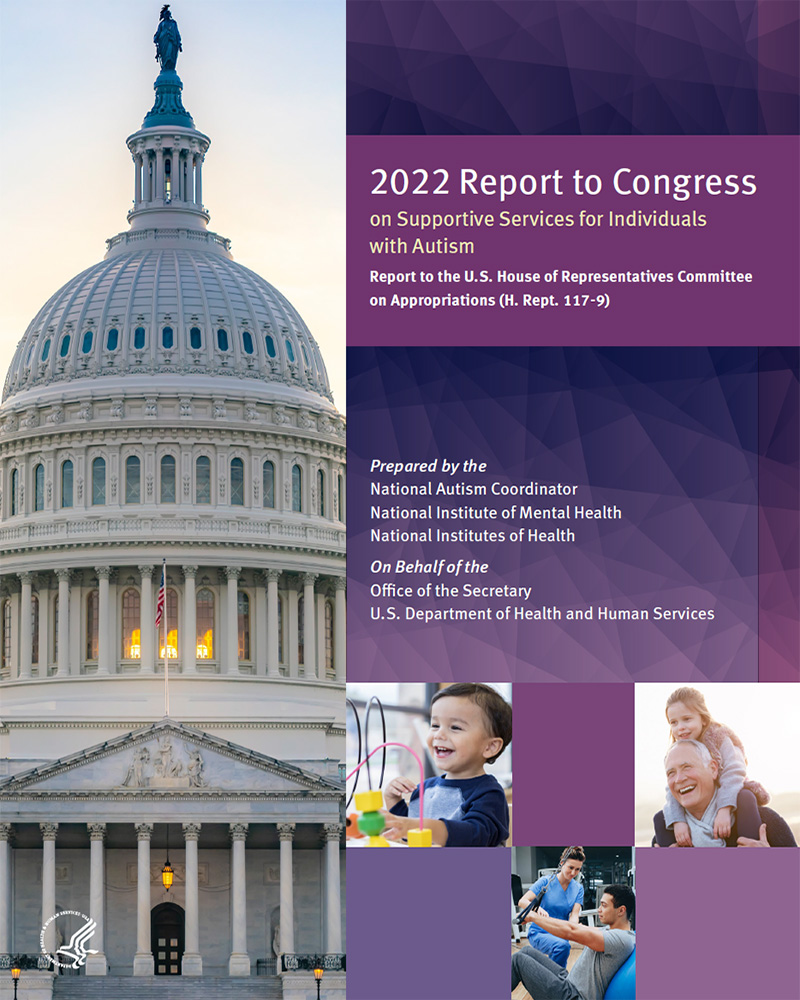2022 Report to Congress
on Supportive Services for Individuals with Autism
Report to the U.S. House of Representatives Committee on Appropriations (H. Rept. 117-9)
Introduction

Autism Spectrum Disorder
Autism spectrum disorder (ASD) is a developmental disability (DD) identified in 1 in 44 children1 and approximately 2 percent of adults.2 Autism contributes to differences in areas including social interaction and communication, executive functioning, sensory processing, and motor coordination. These differences can impact social relationships and other aspects of daily living. Each individual on the autism spectrum has a distinct and unique set of strengths and difficulties and may need varying levels of support in different areas. For example, some individuals on the autism spectrum have accompanying language and/ or intellectual disabilities (ID) or other co-occurring physical or mental health conditions that may result in additional challenges and require specialized supports across the lifespan. Data from the Centers for Disease Control and Prevention (CDC)’s Autism and Developmental Disabilities Monitoring (ADDM) Network indicate that 35 percent to 52 percent of children on the autism spectrum have co-occurring ID.1, 3
Autism is a lifelong disability and an individual can be affected in varying ways throughout the life course resulting in different needs at different stages of life. The combination and degree of ASD-related challenges and co-occurring physical and mental health conditions can also differ greatly from one individual to another, creating support needs for autistic individuals that can range from modest to very intensive. A wide variety of services and supports are available to help maximize health and well-being among children and adults on the autism spectrum, many of which are provided under the Individuals with Disabilities Education Act (IDEA) through age 21 (depending on state law), or the Early and Periodic Screening, Diagnostic, & Treatment (EPSDT) benefit for children under age 21 enrolled in Medicaid, or funded by Medicaid’s Home and Community-Based Services (HCBS) state plan and waiver programs. Some individuals with intensive needs receive long-term services and supports (LTSS) through Intermediate Care Facilities for Individuals with Intellectual Disabilities (ICF/IID), though where possible, individuals with intensive needs can receive LTSS through the HCBS program and live in home and community-based settings. Additionally, some disability services are available through managed-care or at no cost through federal, state, and local programs. However, the availability, scope, and duration of supports varies by state, and some types of supportive services may not be reimbursable. Families and individuals often require assistance in connecting to additional specialists and resources and may pay for certain supportive services out of pocket, adding additional financial strain. In many cases, individuals and families cannot afford to pay, and go without needed services. This exacerbates already significant health equity issues and disparities in the provision of quality services. The result is a "patchwork" system where families and individuals must identify available services and navigate multiple sources and sets of requirements to access services, making it challenging to access and maintain connection to the specific services and supports that they need.
Autism continues to be a top national health priority, and enhanced and expanded service options, healthcare coverage, equitable access, and systems navigation support are important areas of need and opportunity in the effort to provide a robust system of supportive services for autistic individuals and their families. Federal agencies, private research and services organizations, advocacy groups, academia, state and local agencies, and other entities engage in collaborative efforts to improve relevant services and support systems and advance the evidence base on the benefits of interventions and services. This report describes the supportive services that are beneficial to improved outcomes for people with autism and reviews existing coverage policies for these services.
Please note: The terms "individuals with autism," "individuals with ASD," "autistic individuals," and "individuals on the autism spectrum" are used interchangeably throughout this document. Some members of the autism community prefer one term, while others prefer another. The U.S. Department of Health and Human Services (HHS) respects the different opinions within the community on the use of this language and does not intend to endorse any particular preference. In addition, the terms "autism" and "autism spectrum disorder (ASD)" are used interchangeably throughout this document unless otherwise noted. In cases where the specific DSM-5-TR defined diagnosis of autism spectrum disorder (ASD) is discussed, that term is used.
Legislative Background
This 2022 Report to Congress on Supportive Services for Individuals with Autism describes supportive services and resources for individuals on the autism spectrum and their families. A summary of the research evidence base on the benefits of these services is also provided, and existing coverage policies are reviewed.
In its report on the fiscal year (FY) 2022 appropriations for HHS,the House Committee on Appropriations stated the following:
“The Committee is aware that treatment regimens and care plans for autism will continue throughout the life of the patient and that clinicians often spend additional time on patient care by providing supportive services or helping caregivers connect with additional specialists and resources. These additional services are not typically reimbursable. The Committee directs the Secretary to identify the supportive services that are most beneficial to improved outcomes for autism patients, review existing coverage policies for these services, and provide a report on its interim findings no later than 180 days after the date of enactment of this Act.” (House Report 117-96, Page 233)
As the scope of supportive services for people with autism and related conditions and disabilities is very broad, federal activities related to supportive services are conducted by multiple federal departments and agencies. This report was coordinated by the National Autism Coordinator (NAC), National Institute of Mental Health (NIMH), National Institutes of Health (NIH), on behalf of the Office of the Secretary of the U.S. Department of Health and Human Services (HHS), with input from the Federal Interagency Workgroup on Autism (FIWA), the support of the NIMH Office of Autism Research Coordination (OARC) and the Office of National Autism Coordination (ONAC), and in collaboration with federal agencies and offices within HHS, as well as the U.S. Departments of Defense, Education, Housing and Urban Development, Justice, Labor, Transportation, and Veterans Affairs, and the Social Security Administration. All departments, agencies, divisions, and offices contributing to this report conduct activities related to individuals with ASD and/or target intellectual and developmental disabilities (IDD) more broadly while including ASD as a significant focus. Information for FY 2022 may not be complete, as this report was in preparation during FY 2022.




